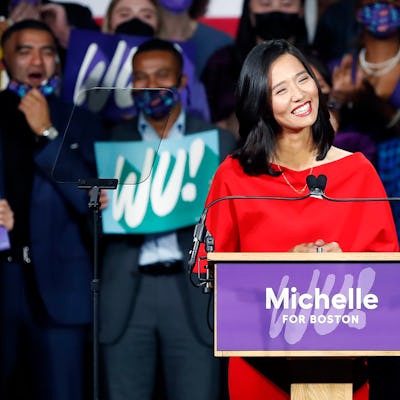“One of my sons asked me the other night if boys can be elected mayor of Boston. ... Not tonight.”

Boston Globe/Boston Globe/Getty Images
Michelle Wu wins in Boston, becoming the first non-white non-man to be elected mayor
The past few years have seen a number of firsts when it comes to women of color in political offices. From Reps. Rashida Tlaib (Mich.) and Ilhan Omar (Minn.) becoming the first Muslim women elected to Congress to Vice President Kamala Harris in the White House, there’s plenty to note. This week, Michelle Wu added her name to the list, making history by becoming Boston’s first woman and Asian American mayor.
On Tuesday, Wu, whose parents immigrated to the U.S. from Taiwan, defeated Annisa Essaibi George. Essaibi George and Wu are both Democrats who serve on Boston’s city council. Essaibi George conceded the race Tuesday and offered her congratulations to Wu, stating, “I know this is no small feat.”
Per The New York Times, Wu grew up in Chicago before moving to Boston to attend Harvard University and Harvard Law School. In 2013, Wu was elected to city council. Since then, she has made a name for herself as a progressive candidate in the city. In many ways, Wu’s politics are reminiscent of The Squad — proven by the fact that one of its members, Massachusetts Rep. Ayanna Pressley, herself a former Boston city councilor, endorsed Wu.
As NPR described, Wu stood in contrast to Essaibi George’s more old-guard version of the future, with plans for climate action, rent control and stabilization, and free public transportation. Wu will be sworn into office on Nov. 16, but she took time to celebrate with her supporters off the bat on Tuesday night.
“We are ready to meet this moment,” Wu said, per the Associated Press. “We are ready to become a Boston for everyone. We’re ready to be a Boston that doesn’t push people out, but welcomes all who call our city home.”
Along with endorsements from high-profile politicians, like Massachusetts Sens. Elizabeth Warren and Edward Markey, Wu gained a lot of support from unions within the city. Last week, the local chapter of the Service Employees International Union endorsed Wu for mayor. In a press release, union vice president Cokiena Fuller said, “As a social worker, I have seen firsthand what happens when communities don't have the resources needed to thrive. Michelle is committed to fighting for the urgent issues we are facing — racial justice, workers’ rights, and climate justice among them.”
In addition to the SEIU, over 100 health care workers endorsed Wu for mayor. The workers put together a public letter, stating, “It is crucial that the next mayor of Boston is prepared to take bold, urgent steps to advance public health, community resiliency, and racial justice.”
For nearly 200 years, Boston elected only white men as mayors. Finally, when Kim Janey took over as acting mayor earlier this year after Marty Walsh left to serve in the Biden administration, she broke the color and gender barrier to leadership in Beantown. Because Janey did not take office via election, though, Wu’s victory is another milestone. The Associated Press reported that Wu said, “One of my sons asked me the other night if boys can be elected mayor of Boston. They have been, and they will again someday, but not tonight.”